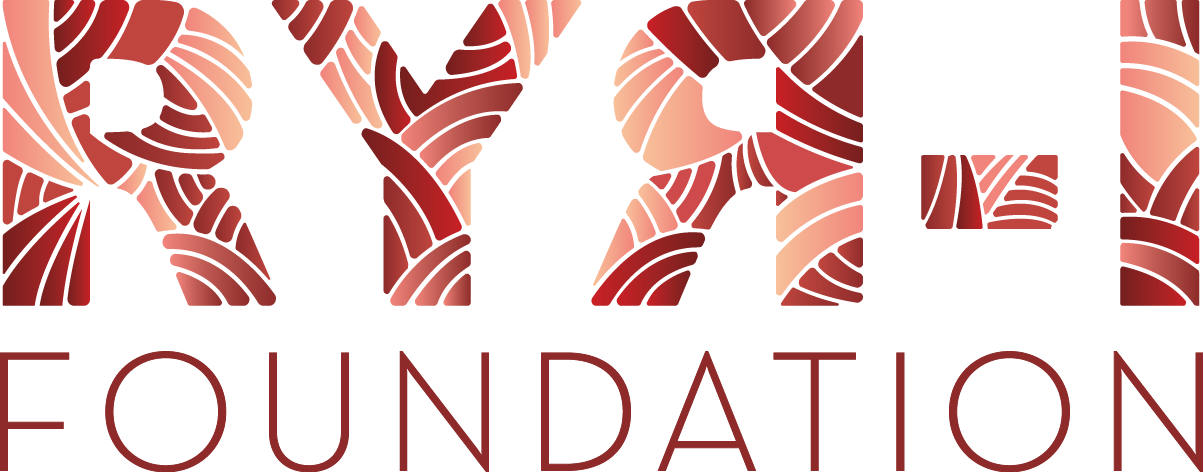
|
Dear Friends, It’s hard to believe 2025 is already coming to a close. We can’t help but reflect on what an incredible year it’s been for The RYR-1 Foundation community. Together, we’ve reached exciting milestones — from funding innovative new research grants to bringing families, scientists, and clinicians together at our Family Conference and Research Workshop. Thanks to your continued support, we’re driving real progress in the fight against RYR-1-Related Diseases (RYR-1-RD). We’re excited to share that CHOP is hosting a symposium on respiratory care in neuromuscular diseases on November 14, available both in person and virtually. Registration closes on November 7, so don’t miss out on this amazing opportunity — be sure to sign up soon! In other exciting news, we’re proud that The RYR-1 Foundation was recently featured in Mt. Lebanon Magazine, helping us raise awareness about RYR-1-RD and share our mission with an even wider audience. Be sure to tune in to the special episode of the Fly Penguins Fly Podcast featuring our very own Cody Hodgson, recorded live at the 2025 Family Conference — a powerful and inspiring conversation you won’t want to miss! Looking ahead, GivingTuesday is just around the corner on December 2nd. Your continued generosity makes it possible for us to fund groundbreaking research, support affected families, and spread hope around the world. Two exciting new studies help scientists and healthcare providers better understand how RYR1 mutations affect the body — one pointing to a promising strategy to prevent or manage Malignant Hyperthermia (MH) and Enhanced Sensitivity to Heat Stroke (ESHS), and another revealing how these mutations may lead to scoliosis and other skeletal changes by altering muscle spindle function. Finally, don’t forget — there’s still time to join the Natural History Study, a critical effort to advance understanding and treatment of RYR-1-RD. Details on how to participate can be found below. Thank you for being such an important part of our community. Here’s to closing out 2025 with gratitude, hope, and momentum for the year ahead! Best Wishes, |
 |
| Lindsay Goldberg, BSN, RN Executive Director, Patient Liaison & Co-Founder The RYR-1 Foundation |
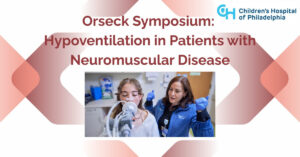
Explore Best Practices for Managing Hypoventilation in Children
Join CHOP’s Division of Pulmonary and Sleep Medicine on Friday, November 14 for an afternoon symposium designed for providers caring for children with neuromuscular disease.
During this session, leading specialists will discuss the development of hypoventilation in these patients and share practical strategies for assessing and managing hypercapnic respiratory failure.
The event will be offered in a hybrid format, allowing participants to attend either in person or virtually.
For more details and to register, please visit the registration website. The deadline to register is Friday, November 7. A link to join the symposium virtually via Microsoft Teams will be sent after registration.
Register Now for the Symposium!
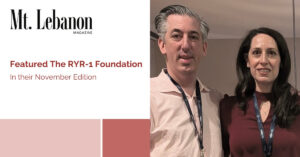
The RYR-1 Foundation is thrilled to share that we’ve been featured in the November issue of Mt. Lebanon Magazine! This wonderful local publication highlights the important work our organization is doing to raise awareness, advance research, and build community for families affected by RYR-1-Related Diseases (RYR-1-RD).
“We wanted to build community and accelerate research,” said Dr. Michael Goldberg, Board President & Co-Chair of Research. “Our ultimate goal is a cure.”
We’re incredibly proud to be part of the Mount Lebanon community and grateful for the opportunity to share our story with our neighbors. Bringing awareness to RYR-1-RD is one of our top goals, and this feature helps us reach even more people who can join us in our mission.
“It’s amazing to see how Mt. Lebanon residents step up — from teachers volunteering with the Kids’ Club to doctors sharing their expertise,” added Lindsay Goldberg, Executive Director & Patient Liaison. “We’re so proud to be part of this community.”
The article offers an inspiring look at how the Organization began 11 years ago — and the remarkable progress made toward better care, stronger connections, and, ultimately, a cure.
A heartfelt thank-you to Mt. Lebanon Magazine for helping us spread awareness and shine a light on our mission! Together, we’re building hope, one story at a time.

We’re excited to announce a special upcoming episode of the Fly Penguins Fly Podcast featuring our incredible community member, Cody Hodgson, and his journey with Malignant Hyperthermia caused by an RYR1 variant (mutation)!
This inspiring episode also features members of The RYR-1 Foundation team, including Dr. Sheila Riazi (Scientific Advisory Board Member), Dr. Michael Goldberg (Board President & Co-Chair of Research), and Lindsay Goldberg (Executive Director & Patient Liaison).
“Cody Hodgson’s journey as an NHL ice hockey player is ultimately what brought his deeper story to the attention of Fly Penguins Fly Podcast,” said Jeff Taylor, co-host of the podcast.
Recorded live at the 2025 Family Conference, Jeff sits down with Cody to discuss his remarkable hockey career, his personal experience living with RYR-1-RD, and what the future holds. The episode also includes exclusive interviews with Dr. Riazi, Dr. Goldberg, and Lindsay Goldberg, who share important insights into RYR-1-RD research, treatment, and the growing impact of our community.
Tune in November 6, 2025, on your favorite podcast platforms — Apple Podcasts, Spotify, Simplecast, Pod Paradise, Podcast Addict!
A heartfelt thank-you to Jeff Taylor and the entire Fly Penguins Fly team for helping amplify the voices and stories that matter most. Together, we’re spreading awareness, inspiring hope, and building a stronger community.
As the year draws to a close, GivingTuesday is almost here—a global day dedicated to generosity and impact. Mark your calendar for December 2nd, and join us in supporting progress for everyone affected by RYR-1-Related Diseases (RYR-1-RD). Together, we can make a difference!
Coming Soon: Our End-of-Year Newsletter! We can’t wait to share our 2025 highlights—and give you a sneak peek at what’s ahead in 2026. We’re so grateful for your continued support—here’s to hope, discovery, and progress in the year ahead.
Ready to Make a Difference? Starting a Fundraiser Is Simple!
If you’re thinking of raising funds on Facebook or Instagram (Meta), you’re already off to a great start—Need help? Step-by-step instructions are available on our website to get your fundraiser up and running in minutes. Here’s How You Can Do Even More!
From personal fundraisers to creative giving ideas and community events, there are countless ways to get involved. We’re here to help—and will connect you with others in the RYR-1-RD community who’ve hosted successful fundraisers for inspiration and support.
Get Started with Our Fundraiser Toolkit
Our Fundraiser Toolkit has everything you need—tips, templates, and resources—to plan, promote, and celebrate your giving efforts. Every dollar raised fuels our advancements for critical research and provides essential resources for individuals and families living with RYR-1-RD.
Together, we make a lasting impact. Thank you for being part of this incredible community and for helping us move closer to a world where RYR-1-RD no longer holds anyone back. Let’s make this giving season our most impactful yet!
Learn More About Supporting Our Cause
We’re honored and proud that two co-authors of the newly published article, “Phosphorylation of RYR1 at Ser2902 decreases Ca2+ leak in skeletal muscle and susceptibility to malignant hyperthermia and heat stroke,” in Science Signaling — Dr. Susan Hamilton and Dr. Filip Van Petegem — are closely connected to The RYR-1 Foundation. Dr. Hamilton serves on our Board of Directors, and Dr. Van Petegem is a member of our Scientific Advisory Board.
The protein encoded by the RYR1 gene plays a key role in the release of calcium (Ca2+) from intracellular (located within the cell) stores in the sarcoplasmic reticulum (SR). Ca2+ release is needed for muscle contraction, but increased RyR1 receptor Ca2+ leak arising from some RYR1 mutations can cause muscle disease. Individuals with RYR1 variants (mutations) associated with Malignant Hyperthermia (MH), frequently also display Enhanced Sensitivity to Heat Stroke (ESHS) when exposed to elevated environmental temperatures.
In this new study, researchers identified a new mechanism by which muscle regulates Ca2+ leak. An enzyme called SPEG phosphorylates (introduces a phosphate group) at a site (designated Serine 2902) on the RyR1 protein to reduce the SR Ca2+ leak. They created mice with a mutation in RYR1 that mimics this phosphorylation and it showed markedly decreased sensitivity to both volatile anesthetics and environmental heat.
“This study confirms that decreasing SR Ca2+ leak is an effective therapeutic strategy for reducing the probability of MHS and ESHS episodes in individuals with these types of variants in RYR1,” said Dr. Susan Hamilton.
“The findings of this paper show that a phosphate at a very specific site can dampen RyR1 activity, effectively reversing the effects of disease-causing mutations in RYR1,” added Dr. Filip Van Petegem. “This exciting observation will undoubtedly spur new ideas on how to handle leaky RYR1 in disease.”
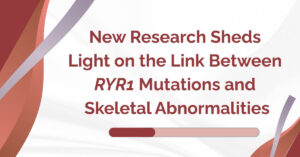
A recent article titled “Massive reduction of RyR1 in muscle spindles of mice carrying recessive Ryr1 mutations alters proprioception and causes scoliosis”—published in The Journal of Physiology—was co-authored by two scientists who have previously received research grant funding from The RYR-1 Foundation. Dr. Susan Treves has also served on The RYR-1 Foundation’s Scientific Advisory Board.
Muscle spindles are tiny sensors located deep within our muscles that help the body detect movement and maintain posture and coordination. When these spindles don’t work properly, it can affect how we move and may contribute to skeletal problems such as scoliosis (curved spine), kyphosis (rounded back), and joint contractures (limited joint movement).
A new study explored how RYR1 mutations, which are known to cause congenital myopathies (muscle weakness present at birth), might also affect these important sensory organs. Using a mouse model with RYR1 mutations similar to those found in a severely affected child, researchers discovered that:
-
The RyR1 protein—responsible for releasing calcium needed for muscle contraction—is present in specific regions of the muscle spindle.
-
The muscle spindles in the affected mice showed biochemical and structural defects.
-
The RyR1 protein function in these spindle muscles was significantly reduced.
These findings suggest that RYR1 mutations may not only cause weakness in regular muscles but could also affect the function of muscle spindles. This could help explain why some individuals with recessive RYR1 mutations experience skeletal abnormalities in addition to muscle weakness.
“This study is highly relevant to the RYR-1-RD patient community and their healthcare providers, as it provides strong scientific evidence explaining why individuals with RYR1 mutations often experience not only muscle weakness but also a wide range of skeletal deformities and joint contractures,” said Drs. Susan Treves and Francesco Zorzato. “The findings by Ruiz et al. clarify how recessive RYR1 mutations affect skeletal development—insights that may help healthcare providers design targeted physical therapy exercises to mitigate these additional effects.”
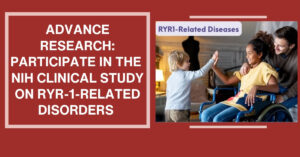
There is still time to participate in the Natural History Study on RYR-1-Related Disorders (RYR-1-RD) being conducted at the National Institutes of Health (NIH). The goal of the study is to better understand the clinical features and progression of RYR-1-Related Disorders (RYR-1-RD) in both children and adults.
Tokunbor A. Lawal, PhD, FNP-BC, an independent research scholar in the Division of Intramural Research at the NIH, is leading the study.
The details are below:
Who Can Participate?
- Individuals 7 years or older
- confirmed genetic diagnosis of RYR-1-RD
- Resides in the United States
Who Is Not Eligible?
- Individuals with other neuromuscular diseases causing muscle weakness
Interested in Participating?
To learn more or to enroll, contact the NIH Office of Patient Recruitment: call (800)411-1222 or email ccopr@nih.gov. Please refer to Research Study #01737-CC.
Participation in the study could help advance research and future treatments for RYR-1-RD!

